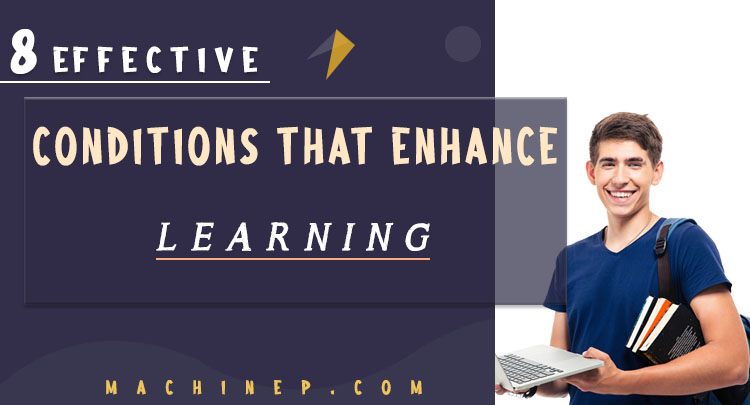Learning is defined as the acquisition of knowledge or skills through study, experience, or being taught. Learning is one of the most fundamental concepts and most researched areas in the domain of psychology.
Learning is the means through which we acquire, not only skills and knowledge but values, attitudes, and emotional reactions as well. Learning can be intentional or unintentional.
Unintentional learning occurs in informal situations as when a student learns a song without setting out to learn it or in the case of a child who learns to cry at the sight of any woman on uniform (nurse) because of previous experiences with a nurse.
Intentional learning occurs in the classroom when students are presented with materials or when a student acquires information by looking up a topic in an encyclopedia.
In intentional learning, three basic elements are present; the learner, the activities of both the teacher and pupil, and a set goal. The activities are structured in such a way as to provide learning experiences.
8 Effective Conditions that Enhance Learning
- The teacher and the Teaching Methods
- Active Participation in Learning
- Knowledge of the Progress learning
- Resources/Instruments/Tools for Learning
- Ability and Interest for Learning
- Financial/Parental/Social and Psychological support
- Conducive Environment for Learning
- Theoretical and Practical Examination
1. The Teacher and the Teaching Methods
The teacher’s personality and his methods of teaching facilitate learning. A teacher’s pleasant and friendly personalities are capable of setting student at ease at every point in time. A teacher who presents the learning materials in an orderly, methodologically, correct manner and shows a clear mastery of his/her subject arouses the interest and respect of his students.
However, the teacher is a role model to the students because the students look up to the teacher to instruct them on how to achieve their dreams of acquiring knowledge or becoming a professional in one field or the other. So, it is the duty of every teacher to put in his/her in the teaching process to impact the right knowledge to the learners.
In the same way, there are many teaching methods used by different teachers, but it is pertinent to figure the best methods to be used during the teaching process. Nevertheless, the teacher and the teaching methods are necessary conditions that enhance learning.
2. Active Participation in Learning
Students learn better by doing (practicing) rather than by listening passively. Active participation can take the form of debates, class assignments, sports, drama, oral answering of questions in class, and so on.
Active participation boosts learning by 25% because it is a great tool to retain knowledge for a long term.
3. Knowledge of the Progress of Learning
Every perfect knowledge is acquired through a procedure, pattern, or criteria with the progression from preliminary stages/level to the zenith/professional stages. These stages are the process of learning, and it is a good condition to be considered for learning to be effective.
Its application is evident in the use of outlines, overview, and other forms to practically introduce the learner to the process of learning and also instantiate the nature of the prospective discourses. Again, a good knowledge of the process of learning allows the learner to learn ahead for a more outstanding result/outcome.
Students’ knowledge of their progress which we call “feedback” is an effective form of motivation. The knowledge of progress becomes critical especially when it is positive and encouraging. Teachers need, therefore, to mark, grade, and furnish students with knowledge of results as soon as possible.
4. Resources/Instruments/Tools for Learning
These resources might be personal, social, and technical resources. The personal resources include adequate capacity such as intelligence and temperament to learn the material presented; sufficient prior knowledge and ample motivation to learn. The social resources include support from home and friends while the technical resources consist of finance, materials, equipment, and relevant experience. Again, the learner must take advantage of these resources and opportunities.
This means that the learner has a major role to play in the learning process while the teacher employs different approaches and activities to create a conducive learning environment; the learner actively interacts with the environment and benefits from it.
5. Ability and Interest for Learning
Ability and interest must be present to facilitate learning. Health plays an important role in learning. Healthy children learn more effectively than unhealthy children. Children who suffer from malnutrition do not grow well. Stunted growth affects the total development including intellectual powers.
Best Ways to Improve your Intelligence, Must Read for All Students
Therefore, the school should always check on students’ health in order to treat those diseases that bother students and reduce their active and effective participation in learning. Furthermore, effective study habits are another factor that enhances learning.
The formation of effective study habits is quite central in facilitating learning. An intelligent child who does not know how to study will often score a ridiculously low grade compared to his potential. Professor Robinson’s method of study (Question, read, survey, recite, and review).
6. Support for Learning
It is simply impossible for learning to take place in the absence of financial, parental, social, and psychological support from parents, teachers, fellow learners, and the society at large. This is the process of providing the necessary assistance to make the learning process to be more effective.
Simply put, support for learning is a condition that enhances learning effectively.
7. Conducive Environment for Learning
A conducive environment is a great factor to be considered for effective learning to take place. The conducive environment for learning simply means the nature of the environment that learning is taking place.
The importance of the learning environment in learning cannot be overemphasized since learning takes place in an environment. The social psychology of a learning environment is characterized by friendliness among teachers, a warm relationship between students and teachers, respect for one another, the use of decent language in formal and informal interaction between staff and the students, emphatic considerations for problem children and those experiencing difficulties, etc.
Denigration, abuse, and mockery are inimical to a peaceful co-existence among human beings. If teachers and students mind their language and show respect for one another, the environment will be congenial and conducive to learning.
8. Theoretical and Practical Examination
Practical evaluation/examination in learning is highly necessary for an effective acquisition of knowledge. This is a moment when the Teacher accesses the works given to the learners, to figure out the strength and weaknesses, and make possible corrections. However, the theoretical and practical evaluation/examination condition the learner to discover the progress he/she has made over time, and this will enable the learner to figure out his/her strength and weaknesses.
In conclusion, learning should be geared towards solving real problems in life, such as poor social adjustment, teacher-student conflict, and hostility in the classroom amongst others. And, in order to enhance learning, the 8 effective conditions to enhance learning should be put into consideration.






Very engaging article.
These tips are really helpful..
I love the efforts you have put into this, thank you for all the great posts.
Great guides
Good writeup